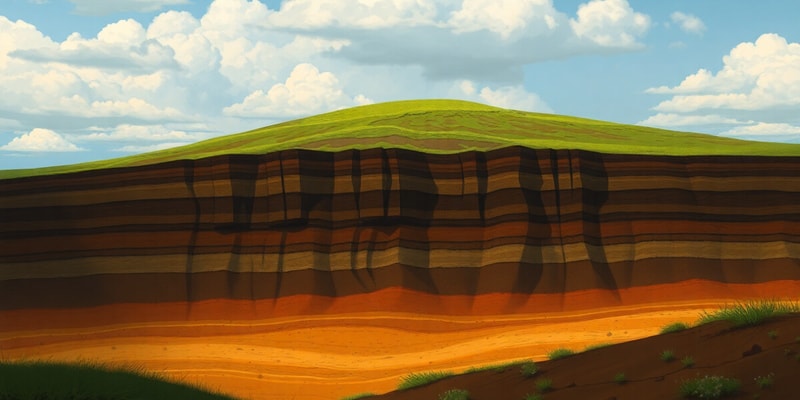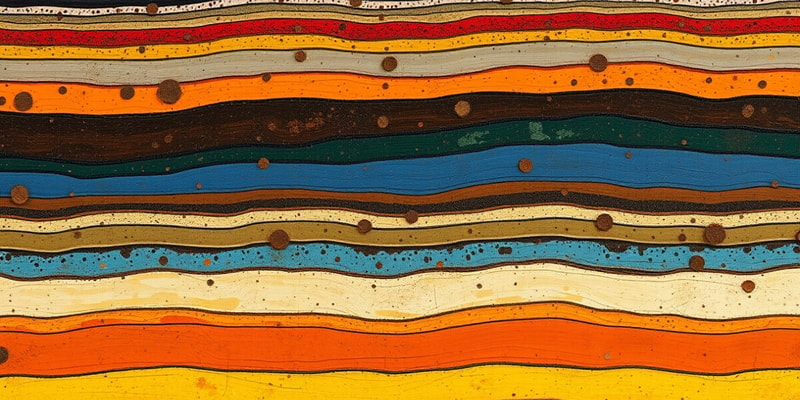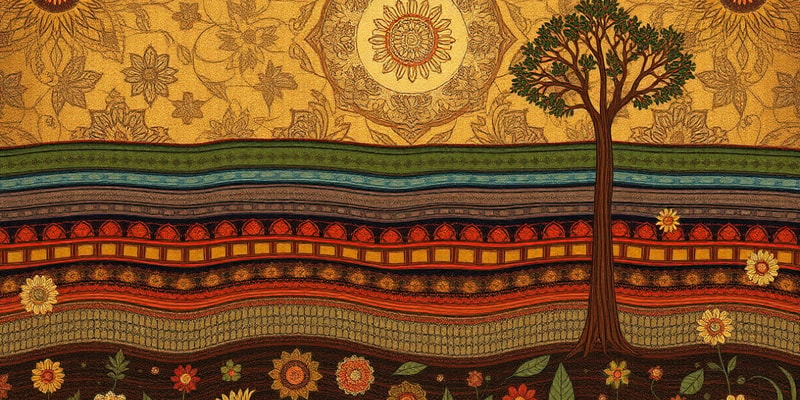Podcast
Questions and Answers
What has contributed to the increase in soil salinity over the years?
What has contributed to the increase in soil salinity over the years?
The annual rate of agricultural land loss has increased since 1986.
The annual rate of agricultural land loss has increased since 1986.
False
What two main human activities threaten soil availability?
What two main human activities threaten soil availability?
Urbanization and intensification of agricultural systems
The expansion of ______ accelerates land degradation in rural areas.
The expansion of ______ accelerates land degradation in rural areas.
Signup and view all the answers
Match the following land use activities with their impacts:
Match the following land use activities with their impacts:
Signup and view all the answers
Which of the following is a factor contributing to land degradation in the Maltese islands?
Which of the following is a factor contributing to land degradation in the Maltese islands?
Signup and view all the answers
Soil provides no significant value as a natural resource.
Soil provides no significant value as a natural resource.
Signup and view all the answers
Identify one consequence of heavy rainfall on the soil mentioned in the text.
Identify one consequence of heavy rainfall on the soil mentioned in the text.
Signup and view all the answers
What are the main components of soils?
What are the main components of soils?
Signup and view all the answers
Maltese soils are generally deep and rich in organic matter.
Maltese soils are generally deep and rich in organic matter.
Signup and view all the answers
Name one factor that influences soil formation.
Name one factor that influences soil formation.
Signup and view all the answers
The main types of pollution affecting Maltese soils include point sources such as __________ and __________.
The main types of pollution affecting Maltese soils include point sources such as __________ and __________.
Signup and view all the answers
What percentage of Maltese soils have a clay content of higher than 48 percent?
What percentage of Maltese soils have a clay content of higher than 48 percent?
Signup and view all the answers
Match the following types of landscapes with their description:
Match the following types of landscapes with their description:
Signup and view all the answers
The length of time soil has been forming does not influence its properties.
The length of time soil has been forming does not influence its properties.
Signup and view all the answers
What is one of the vital functions performed by Maltese soils?
What is one of the vital functions performed by Maltese soils?
Signup and view all the answers
Which of the following is NOT a factor contributing to desertification?
Which of the following is NOT a factor contributing to desertification?
Signup and view all the answers
Soils are considered a non-renewable resource.
Soils are considered a non-renewable resource.
Signup and view all the answers
What term is used to describe the loss of soil fertility primarily in drylands due to human activities?
What term is used to describe the loss of soil fertility primarily in drylands due to human activities?
Signup and view all the answers
Soil erosion is caused by both natural elements such as wind and _____ activities.
Soil erosion is caused by both natural elements such as wind and _____ activities.
Signup and view all the answers
Match the following terms with their definitions:
Match the following terms with their definitions:
Signup and view all the answers
What is the primary function of soil?
What is the primary function of soil?
Signup and view all the answers
What major environmental event in the 1930s is associated with poor agricultural practices leading to soil erosion?
What major environmental event in the 1930s is associated with poor agricultural practices leading to soil erosion?
Signup and view all the answers
Excessive cattle grazing can lead to improved soil retention of water.
Excessive cattle grazing can lead to improved soil retention of water.
Signup and view all the answers
Soil formation occurs exclusively from the decomposition of organic matter.
Soil formation occurs exclusively from the decomposition of organic matter.
Signup and view all the answers
What is the estimated amount of soil loss in metric tons that the USA experiences each year due to poor soil management practices?
What is the estimated amount of soil loss in metric tons that the USA experiences each year due to poor soil management practices?
Signup and view all the answers
What is the term used to describe the unweathered parent rock in the soil profile?
What is the term used to describe the unweathered parent rock in the soil profile?
Signup and view all the answers
The layer of soil that contains organic material is known as the ______.
The layer of soil that contains organic material is known as the ______.
Signup and view all the answers
Match the soil horizons with their descriptions:
Match the soil horizons with their descriptions:
Signup and view all the answers
Which of the following is NOT an input to the soil system?
Which of the following is NOT an input to the soil system?
Signup and view all the answers
Soil plays a critical role in supporting biological diversity.
Soil plays a critical role in supporting biological diversity.
Signup and view all the answers
What term describes the weathered layer of loose material resulting from the breakdown of bedrock?
What term describes the weathered layer of loose material resulting from the breakdown of bedrock?
Signup and view all the answers
What is the primary motive for excessive clearance of forests and woodlands?
What is the primary motive for excessive clearance of forests and woodlands?
Signup and view all the answers
Chemical pesticides completely eliminate the need for beneficial insects in agriculture.
Chemical pesticides completely eliminate the need for beneficial insects in agriculture.
Signup and view all the answers
What are the three types of soil erosion caused by moving water?
What are the three types of soil erosion caused by moving water?
Signup and view all the answers
Sustainable agriculture often embraces farming practices that imitate natural __________ processes.
Sustainable agriculture often embraces farming practices that imitate natural __________ processes.
Signup and view all the answers
Which of the following best describes the slash and burn method?
Which of the following best describes the slash and burn method?
Signup and view all the answers
Sustainable agriculture relies heavily on monoculture farming.
Sustainable agriculture relies heavily on monoculture farming.
Signup and view all the answers
Match the type of soil erosion with its description:
Match the type of soil erosion with its description:
Signup and view all the answers
What is one ecological consequence of relying on industrial food production methods?
What is one ecological consequence of relying on industrial food production methods?
Signup and view all the answers
What is one of the main criticisms of sustainable agriculture?
What is one of the main criticisms of sustainable agriculture?
Signup and view all the answers
Conservation tillage practices disturb the soil as much as conventional ploughing.
Conservation tillage practices disturb the soil as much as conventional ploughing.
Signup and view all the answers
What farming practice involves ploughing across a slope following its contour lines?
What farming practice involves ploughing across a slope following its contour lines?
Signup and view all the answers
The process of reducing soil erosion and restoring soil fertility is known as ______.
The process of reducing soil erosion and restoring soil fertility is known as ______.
Signup and view all the answers
How much can a mulch tiller reduce soil loss by?
How much can a mulch tiller reduce soil loss by?
Signup and view all the answers
Match the soil conservation techniques with their descriptions:
Match the soil conservation techniques with their descriptions:
Signup and view all the answers
Terracing is primarily used on flat land.
Terracing is primarily used on flat land.
Signup and view all the answers
What can be achieved by using appropriate crops and soil residues?
What can be achieved by using appropriate crops and soil residues?
Signup and view all the answers
Study Notes
Soil Definition and Importance
- Soil is a thin layer covering most land surfaces, crucial for human existence.
- It provides the foundation for food production, water storage & filtration, and a habitat for diverse organisms.
Soil Formation
- Soil forms through the interaction of rock and the environment.
- Weathering breaks down rock into smaller fragments.
- Organic matter from living organisms is incorporated into the soil.
- Water, minerals, and gases are also present in soil.
- Soil develops a distinct layer structure or profile.
- Key factors influencing soil formation include climate, rock type, topography, and soil-forming processes.
- The top layer of soil is called regolith.
Soil Horizons
- Soil profiles are vertical sections displaying distinct layers.
- O-Horizon: the uppermost layer containing organic materials (decayed leaves, etc.)
- A-Horizon: the topsoil, rich in organic matter and minerals, vital for plant growth.
- B-Horizon: the layer below topsoil, accumulating minerals leached from the A-horizon.
- C-Horizon: the lowest layer, composed of partially weathered bedrock.
- R-Horizon: unweathered parent rock.
Soil Components
- Soil is composed of water, air, minerals, organic matter, and organisms.
- Mineral particles make up the majority of the soil, contributing to physical structure.
- Organic matter, including decomposed plants and animals (humus), enhances fertility.
- Water and air are essential for soil processes and plant growth.
- Organisms, like bacteria and fungi, decompose organic matter and release nutrients.
Soil Factors Influencing Soil Formation
- Parent material (rock type): the initial source of soil material.
- Climate conditions: prevailing weather patterns during soil formation.
- Living organisms: the amount and type of plants and animals influence soil composition and structure.
- Human influence: human activities such as farming, construction, and development affect soil.
- Topography: the slope and elevation of the land impacts erosion and water flow in the soil.
- Time: the length of time a soil has been forming, influences the development of characteristics.
Soil of the Maltese Islands
- Maltese soils are fertile, despite geographic and climatic limitations.
- Soil contamination comes from various sources like industrial waste and agriculture practices.
- Different soils are found in various landscapes.
- Extensive use of irrigation and agricultural practices leads to factors such as soil salinity increases.
- Increased urbanisation means that agricultural land is becoming lost.
Soil Erosion
- Natural factors and human activities lead to soil erosion (movement of top soil by wind or water).
- Overgrazing, overcultivation, deforestation, and other bad agricultural practices can lead to significant soil erosion.
Desertification
- Desertification refers to land degradation in arid and semi-arid regions due to human and environmental influences.
- It's often associated with factors like overgrazing, overcultivation, and deforestation.
Excessive Clearance - Deforestation
- This occurs as a result of the increase demand for both land and fuel.
- The clearing of forests for agriculture or urban development leads to soil erosion.
Salinization
- Excessive salts in irrigated soils harm plant growth.
- Inappropriate irrigation causes damage to soil.
Chemical Pesticides
- Pesticides can destroy beneficial insects and microorganisms vital for soil health.
- Overuse of harmful chemicals reduces soil fertility.
Sheet Erosion, Rill Erosion, and Gully Erosion
- Various forms of erosion cause different levels of soil loss.
- Sheet erosion removes fairly even layers, rill erosion forms small channels, and gully erosion forms larger channels.
Sustainable Agriculture
- Sustainable agriculture focuses on maintaining long-term soil fertility, unlike industrial agriculture which often depletes resources faster than the land can replenish them.
- Practices like contour ploughing, strip cropping, crop rotation, terracing, conservation tillage to build soil fertility.
Studying That Suits You
Use AI to generate personalized quizzes and flashcards to suit your learning preferences.
Related Documents
Description
Test your knowledge on the definition, formation, and importance of soil. This quiz covers various aspects including soil horizons, the processes involved in soil development, and the environmental factors influencing soil. Perfect for students of environmental science and earth sciences.




